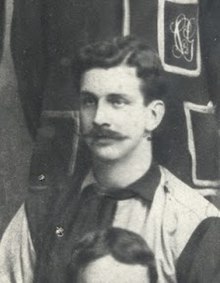Hermann Friese
 Hermann Friese ca. 1904 | |||
| Personal information | |||
|---|---|---|---|
| Date of birth | 22 May 1880 | ||
| Place of birth | Hamburg, Germany | ||
| Date of death | October 1945 | ||
| Position(s) | Forward | ||
Georg Paul Hermann Friese (22 May 1880[1][2] – October 1945) was a German-Brazilian athlete, association football player who played as a forward, and referee. He is considered alongside Charles Miller, Hans Nobiling and Oscar Cox one of the most important pioneers of football in Brazil and is recognized as the first exceptional footballer there.
Early life and family
Friese was born in Hamburg, the son of Hermann Peter Johannes Friese and Henriette Friedericke Adelaide Bertha Hohlers.[1]
Career
In 1903, the 23-year-old Friese migrated from Germany to Brazil where he joined Sport Club Germânia, the club of the German community of São Paulo, founded in 1899 by Hans Nobiling. Like Nobiling, Friese played in Hamburg for SC Germania 1887 - one of the precursors of today's Hamburger SV - which gave name and colours to the Brazilian club.
Friese was top scorer of the State Championship of São Paulo, the Campeonato Paulista of 1905 with 14 goals and won the championship with Germânia in 1906 and 1915. In 1903 the newspaper O Estado de S. Paulo called him "the most sensational player of all time" (o jogador mais sensacional de todos os tempos).[3]
Friese was also coach of the team where around 1909 Arthur Friedenreich obtained his first experiences. "Fried," these days considered of one of the greatest players of all time, was son of a German businessman that migrated from Hamburg and a black Brazilian woman. By intervention of Friese, statutes of the club prohibiting the membership of coloured people were removed.
Friese also was a football referee - then not uncommon for a player - and officiated the deciding matches of the State Championships of 1903, 1904, 1910 and 1920. He also was referee of the Troféu Interestadual of 1910, where Botafogo FC of Rio de Janeiro defeated AA das Palmeiras with 7-2 in the Velódromo of São Paulo.[4]
On 22 October 1916 he officiated the State Championship between Santos FC and Ypiranga, which also was the opening match for the stadium of Santos, the Vila Belmiro. Santos won the match 2-1.[5] Altogether Friese arbitrated 53 or more State Championship matches.[6]
These days Friese is one of ten patrons of the Academia Paulista de Árbitros de Futebol "Charles Miller," an honour he shares with World Cup referees like José Roberto Wright, Armando Marques, Arnaldo Cézar Coelho and Romualdo Arppi Filho, amongst others.[7][8]
Still in Europe he was a formidable track and field athlete, winning the German championship over 1500 metres of 1902. In May 1907 he was the sole representative of Brazil in an international competition in Uruguay and in one evening won the 1500 and 800-metre competitions and finishing second over 400 metres.
References
- ^ a b Hamburg, Germany, Births, 1874-1901
- ^ Diario Official (Estado de São Paulo), 7 October 1930: "Por outra da mesma data, foi declarado brasileiro Georg Paul Hermann Friese, natural da Allemanha, nascido 22 de maio de 1880, filho de Hermann Peter Johannes Friese, casado, residente no estado de São Paulo."
- ^ "Quando a bola começou a rolar: Charles Miller introduz o futebol no país em 1894". Archived from the original on 9 January 2009. Retrieved 9 October 2013.
{{cite web}}: CS1 maint: bot: original URL status unknown (link), Gazeta Esportiva, ca. 2002, (via Wayback Machine) - ^ Marcelo Leme de Arruda: Troféu Interestadual 1910 Archived 27 November 2012 at the Wayback Machine, Rec.Sport.Soccer Statistics Foundation and RSSSF Brasil, 4 August 2005.
- ^ Guilherme: Santos FC: Vila Belmiro, Blog do Prof Guilherme, 7. October 2010.
- ^ (footbook.com.br/arbitro/27299090,hermann+friese.html) Hermann Friese, Footbook (Árbitros) (via archive.org))
- ^ "Patronos". Archived from the original on 14 December 2009. Retrieved 9 October 2013.
{{cite web}}: CS1 maint: bot: original URL status unknown (link), Sindicato dos Árbitros de Futebol do Estado de São Paulo (via Wayback Machine) - ^ Sergio Correa: Árbitros terão sua Academia Archived 28 January 2011 at archive.today, Cartão Vermelho, 29 January 2004 (Estatuto da Academia Paulista dos Árbitros de Futebol - ACADEPAR).
External links
- Hermann Friese at WorldFootball.net
- CS1 maint: bot: original URL status unknown
- Webarchive template wayback links
- Webarchive template archiveis links
- Articles with short description
- Short description is different from Wikidata
- Use dmy dates from July 2018
- 1880 births
- 1945 deaths
- Brazilian football referees
- Brazilian men's footballers
- German men's footballers
- Footballers from Hamburg
- German footballers needing infoboxes
- Men's association football forwards
- São Paulo state football team players